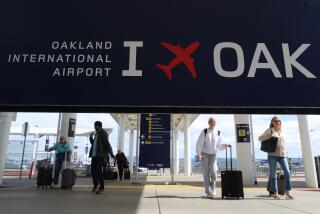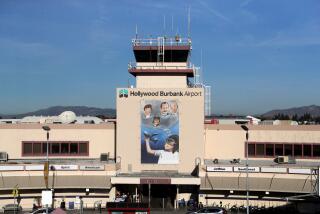Time to Yield on Curfew
Advantage is shifting in the fight over expansion of Burbank Airport. Earlier this month, the head of the Federal Aviation Administration warned that she has no power to unilaterally impose the kinds of curfews and noise restrictions sought by Burbank as the city fights plans to build a new airport terminal. Combined with a series of defeats in court, the letter from FAA administrator Jane Garvey should send a clear signal to Burbank officials that the battle is turning. Better to negotiate a truce and carry home their shields than to keep on fighting and be carried home on their shields.
The Times supports negotiation rather than the expensive legal and public relations battle that both sides have waged over plans to replace the airport’s aging terminal with a larger facility. At various points in the fight, we have singled out the Burbank-Glendale-Pasadena Airport Authority for its apparent arrogance in dealing with Burbank officials trying to protect the neighborhoods around the airfield. At other points, we have criticized Burbank for sometimes childish antics such as making demands it knows cannot be met and walking away from negotiations.
Our comments and suggestions have been aimed at a single goal: construction of a new terminal. The existing 14-gate building sits too close to the runway, increasing the risk of a deadly accident. On busy days, the terminal is crowded and unpleasant, with no room for many passengers to sit. A new terminal would be not only a more friendly place for passengers to wait, it would be a safer place. Plus, a slightly larger facility would help alleviate the regional pressure on airfields such as Los Angeles International Airport.
Burbank officials fear a larger terminal would bring increased traffic and noise. Although most of the airport sits within the city’s boundaries, the city has relatively little control over its operations. Instead, Burbank shares that responsibility with Glendale and Pasadena and the power struggle over expansion has tainted relations among the three neighbors. Burbank’s fears are legitimate. Few people relish the idea of living next door to a busy airport and the City Council owes its residents a duty of protection.
That’s why the city’s lawsuits have been effective--until now. The proposed size of the airport terminal has been reduced, from 27 gates to 19. It’s doubtful that would have happened without pressure from Burbank. But Burbank wants more, including a mandatory nighttime curfew. Such curfews do not come easy. It would be even tougher for Burbank Airport to get one because the jets using the airfield are already among the least noisy in the country. Although airport authority officials have agreed to conduct the noise studies necessary to apply for a curfew, they don’t expect the FAA to approve the restrictions.
The FAA administrator’s letter seems to support that view. Nonetheless, Garvey has offered to help mediate the fight between Burbank and the airport. Burbank should take advantage of the talks. City officials should be proud of what they have accomplished--such as reducing the size of the proposed terminal. Yet they must weigh carefully the future of their fight. The odds of winning a federally imposed curfew are small, the legal costs huge. The city’s strong tax base can support such a fight, but is that really the best use of public money? We don’t think so.
Garvey’s offer of mediation should not be ignored. But negotiations work only when both sides are willing to take their chances in good faith and to live with the outcome. By wedding themselves to an all-or-nothing position on the curfew, Burbank officials risk turning the talks into yet another pointless exercise. Meanwhile, the lawyers get rich and the public gets stuck with the bill.
More to Read
Sign up for Essential California
The most important California stories and recommendations in your inbox every morning.
You may occasionally receive promotional content from the Los Angeles Times.










